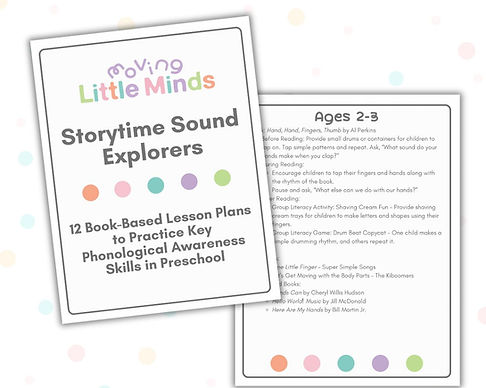Start with Name Games in Preschool! Why This Simple Word Matters MOST.
- Melissa McCall
- Aug 5, 2025
- 6 min read

Start with the Name: Why This Simple Word Makes a Big Impact
Each week during the school year, I volunteer as a reading buddy at my children’s school. I am always paired with a kindergarten class and pull a few children that need support in reading foundational skills. This past year I was paired with the sweetest little guy, an English Language Learner that needed help with letter names and sounds.
I began by holding up flashcards to assess which letters he recognized.
One by one I showed him a letter. "What letter is this?" Blank stare. “Do you know this one?” Shake of the head. “How about this one?” Still no.
But then, I held up a letter from his name. His eyes lit up. He pointed and said proudly: “In my name!”
Every time a name letter appeared, he knew that it was in his name, with confidence! Was he able to say the letter name or sound...not yet! But, he knew that those letters matter most to him, and very shortly after we started working together, he knew them.
That moment reminded me of something we often overlook at the beginning of the year: Children don't learn letters in order—they learn what matters to them.
And nothing matters more than their name.
So, let's capitalize on the fact that meaningful learning sticks for our students, and dive into ways to celebrate name games at the beginning of the year to build community and early literacy skills!
4 Reasons WHY We Should Start with Names
When we start with something personal and meaningful, we unlock so many opportunities for connection and growth. In fact, name-based learning naturally supports four foundational skills at the start of the year: building classroom community, introducing key concepts of print, developing alphabetic knowledge, and strengthening phonological awareness. Let’s take a closer look at how names lay the groundwork for each of these critical areas.

1-Names Build Classroom Community
A child’s name is deeply tied to their identity. When we recognize and celebrate it, we’re doing more than introducing a word, we’re helping that child feel safe, valued, and seen.
Research shows that when children feel a strong sense of belonging in the classroom, they show higher motivation, stronger engagement, and better social-emotional adjustment. (Osterman, 2000; Cappella et al., 2013).
Taking the time to celebrate the uniqueness of each and every child helps to nurture the social-emotional foundation that makes learning possible. And studying names (what does it mean, how long is it, does it have any letters similar to your friends' names) helps recognize both similarities and differences among one another.
2-Names Reinforce Concepts of Print
Concepts of print is the understanding of how print works. In order to be ready to read, it's important that children understand that print carries meaning, that we read from left to right and top to bottom, and that words are made up of letters and separated by spaces, etc.
One of the very first ways to expose children to this concept is to celebrate their names! "Wow! This is your name! It is a word. See how it is made up of letters. When we squish letters together, we make a word. This word is (name)!"
Because children's names are meaningful, it is often the first word they learn to “read.” Through repeated exposure in meaningful contexts, children begin to understand that print carries meaning, print moves left to right, and letters form words.
Name-based print routines give children a front-row seat to how language works on the page.

3-Names Build Alphabetic Knowledge
Children don’t learn letters randomly. They learn them in ways that are personally meaningful, visually familiar, and socially reinforced.
Extensive research by Dr. Shayne Piasta on letter acquisition has revealed that there is no perfect order for introducing the alphabet to children. Why? Because children learn the letters in a variety of unique orders, often beginning where? You guessed it...with the letters in their names!
Therefore, it only makes sense that we use letter names as a launchpad for letter learning. Names give us a natural and motivating context to explore letter shapes, names, and sounds. When we focus instruction on letters from each child’s name, we're not just teaching, but also celebrating uniqueness. It’s an approach both research-supported and classroom-validated.
4-Names Strengthen Phonological Awareness
Before children can decode print, they need to hear and manipulate sounds in spoken words. Names offer a developmentally appropriate entry point for playing with syllables, beginning sounds, onset-rime, and rhymes.
The National Reading Panel (2000) emphasized that phonological awareness, particularly blending and segmenting, is a must-have foundational skill for reading success. By using names to play with sounds, we connect oral language in a way that feels fun and personal.
We can use name play to discuss beginning sounds in names, segment large word parts, and my favorite...rhyming. Every child loves to hear his/her name in the "Banana Fana" song. Playing with names is an easy way to embrace these key skills.
What This Looks Like by Age!
Age 2:
Community:
Name Songs with Movement – Sing simple chants using children’s names (“Hello, hello to Sofia today!”) while passing a stuffed animal or dancing. This builds identity and connection.
Concepts of Print:
Photo Name Cards on Cubbies – Place each child’s photo with their name on their cubby or chair. Point to names often, modeling left-to-right tracking and explaining, “This says Eli—that’s your name!”
Alphabet Knowledge:
Name & Picture Puzzle – Create a laminated photo card of each child with their name below. Cut it into vertical strips (one per letter). Children rebuild the puzzle by putting the picture and name back in order—strengthening letter recognition and sequencing in a developmentally playful way.
Phonological Awareness:
Name Echo Game – Say a child’s name in syllables (“Mi-a”) and invite them to repeat. Then cheer the full name: “Yay, Mia!” Simple repetition builds early syllable awareness.
Age 3:
Community:
Student of the Day – Choose one child each day to be celebrated. Post their name and photo on the board. Invite classmates to ask the student questions and learn more about them. Write the facts on the poster and hang it in a special place in the classroom.
Concepts of Print:
Name Placing Game – Give each child sticky notes labeled with their name. Encourage them to move around the classroom and label items they use (“my cubby,” “my chair,” “my snack!”). This builds print awareness and reinforces the idea that print carries personal meaning.
Alphabet Knowledge:
Name Matching Puzzle – Cut laminated name cards into letter strips. Children rebuild their name like a puzzle, saying each letter aloud as they place it in order. For added support, include a photo at the top of the puzzle.
Phonological Awareness:
Syllable Stand-Up Game – Say a child’s name segmented by syllables (“Me-lis-sa”), then have the class blend and clap the name aloud. When their name is called, the child stands up! It’s a playful way to practice blending and syllable awareness.
Age 4–5:
Community:
Compliment Circle – Each child shares something kind about the student of the day using sentence stems like “I like __ because…” Write compliments into a keepsake class book.
Concepts of Print:
Morning Message with Names – Write a sentence about the student of the day (“Today is Kai’s day!”). Track words left to right, point out capital letters, spaces, and punctuation.
Alphabet Knowledge:
Letter Hunt & Name Build – Hide the letters of the student of the day’s name around the room. Invite the class to find and help build the name together on a pocket chart.
Phonological Awareness:
Mystery Name Poem Game – Hide a child behind a blanket. Recite: “Who’s behind the blanket? Who can it be? A name with some letters. We’ll solve the mystery!” Give clues based on first sound, rhyme, or syllables before revealing the child.
Share these ideas with your staff and teammates!
Grab the PDF version below!
In Conclusion...
In Conclusion...
If we want children to thrive both academically and emotionally, we can begin with what matters to them. And nothing matters more than their name!
Through name play, we build confidence, connection, and critical pre-reading skills that prepare children for lifelong learning. Whose name will we celebrate today? Check out THIS BLOG for more ideas.
Have a favorite name game to share? Drop it in the comments below!
Don't miss an update from Moving Little Minds! SUBSCRIBE HERE!

We believe that every child deserves a bright future, and this begins with a strong foundation in early literacy skills. At Moving Little Minds, we are dedicated to providing research-based literacy activities in fun and engaging ways! By merging instruction with play, we ensure that children are reaching their full potential and embark on their educational journey well-prepared for the
future! Let's build those KEY emergent literacy skills together.






















%20(52).jpg)

Comments